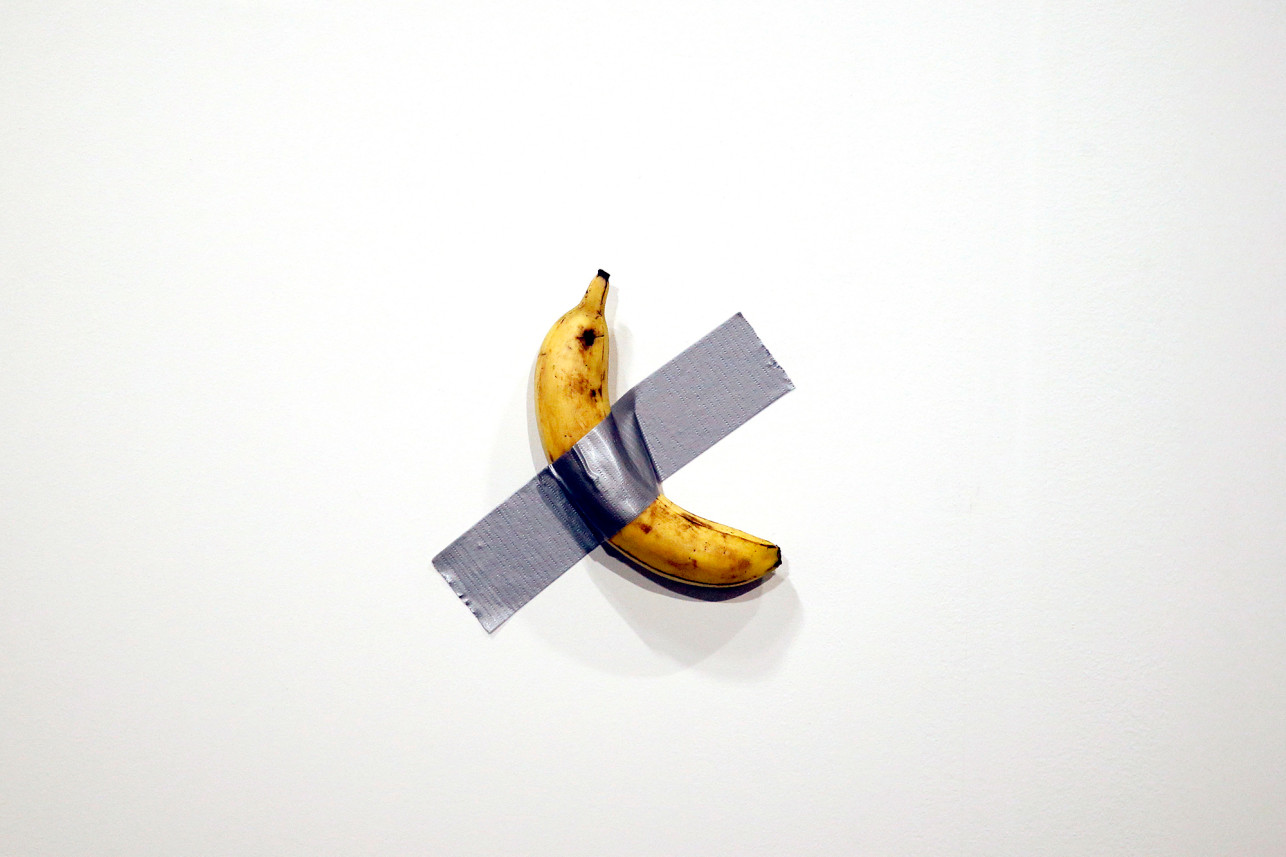The banana is the idea….
December 12, 2019 on News by steveWe all heard about it last weekend (December 2019). Internationally acclaimed artist Maurizio Cattelan presented his most recent work at the Miami Art Basel Art Fair.
The work in question: Comedian, a banana stuck to the wall with a piece of duct tape sold for a whopping $ 120,000.00. In addition, the artist reiterated by “creating” two other copies of the work that sold for $ 120,000 and $ 150,000 respectively!
Maurizio Cattelan is well known for some of his earlier works including America, consisting of a massive gold toilet or La Nona Ora, a sculpture of a pope struck by a meteorite. The meaning of Cattelan’s obvious satire gives him a reputation as a joker in the art world. He is also one of the creators of the Toilet Paper Magazine which is a reflection on the absurd.
However, this approach should be examined in terms of what art represents in our postmodern world.
The vision of the art privileged by this artist is not so far from that which guided the members of the Dada movement a century ago which Marcel Duchamp with his ready-made is one of the best-known examples.
At its peak from 1916 to 1922, the movement was known to ridicule what was perceived as the absurdity of the world, and the influence of the same movement was later found in surrealism, pop art and, by extension, in punk rock. It is a current of thought which is thus, in a certain way, at the very basis of all nihilist currents in art as well as in literature, philosophy and music. Think Warhol, André Breton, John Cage, the Residents – the list is long…
It is also the starting point for a different way of interpreting art and its meaning in a society.
Contemporary art is primarily about the intellect. The “finished product” is often found as the vehicle that conveys the concept and the creative process of the artist.
This “finished product” becomes almost an afterthought and is often eminently “disposable” once the work is presented. Think of the ephemeral installations of Christo and Jeanne-Claude or Jana Sterbak’s meat dress.
It is in this perspective that we must look at Comedian, Maurizio Cattelan’s banana.
He obviously did not sell three bananas and tape for $ 390,000.00. He sold an idea and this idea is … banana … art for art. No material, only an idea.
If we go back to the past centuries, the artists needed patrons since the purchase of works of art was an activity reserved for the nobility and the bourgeoisie and would not have been enough to ensure a decent and acceptable income for the artists. Among the great artists of the past Leonardo Da Vinci, Michelangelo Buonarroti or Raphael could never have left the artistic legacy that survived them without the patrons who allowed them to create at their leisure throughout their career.
Of course, in our modern world, the concept of patronage has shifted somewhat to concepts of the importance of the arts in our societies, which has led to government grant programs that often help artists who in the end, have nothing to “sell” except their thoughts; their soul …
This is even truer in certain demographically limited societies – such as ours in Quebec – where even a successful artist often finds it difficult to make ends meet. But, this is a subject for another chronicle.
Seen in this way, the “collectors” who bought Comedian only perpetuate a great patronage tradition funding Cattelan’s talent and his iconoclastic thinking setting aside the very concept of owning a physical work in favor of a certain pride in having contributed to an artistic event.
If we think about it, we see a film and, once viewed, we have nothing left. We subscribe to Spotify and it is only an impression of the inspiration of the musicians. We will see a show and we will come out of it without having any tangible proof of our experience.
Should the very principle of art as a commodity be linked to the possession of physical goods or, to the pleasure and satisfaction of having participated in a creative process?
That’s the question that contemporary art is asking us as is Cattelan’s banana, and that’s the question we’re asking you today.
S.M.Pearson




